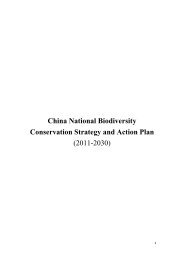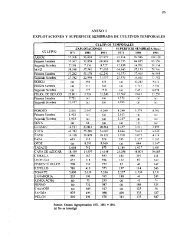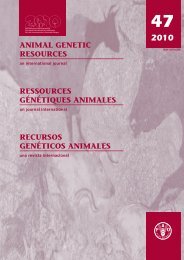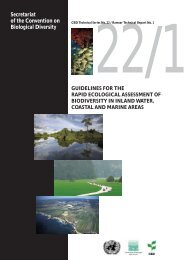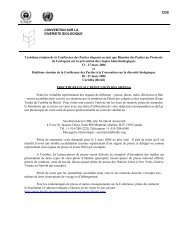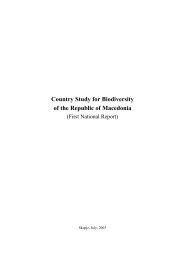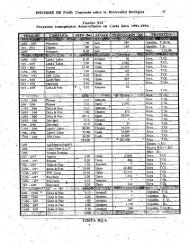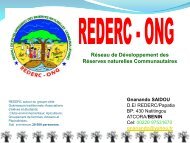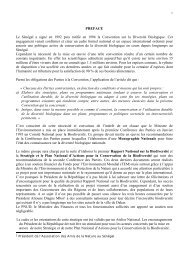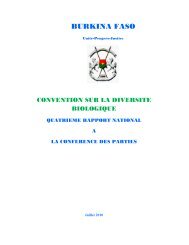CBD Fourth National Report - Azerbaijan (English version)
CBD Fourth National Report - Azerbaijan (English version)
CBD Fourth National Report - Azerbaijan (English version)
You also want an ePaper? Increase the reach of your titles
YUMPU automatically turns print PDFs into web optimized ePapers that Google loves.
Country Study on Biodiversity and <strong>Fourth</strong> <strong>National</strong> <strong>Report</strong><br />
The Republic of <strong>Azerbaijan</strong><br />
erosion processes and multiple floods and slides. <strong>Azerbaijan</strong> is one of sparsely forested<br />
countries. Illegal use and loss of forestries cause to anxiety and trouble (for example, loss of<br />
tugai forests).<br />
At the same time, construction of highways and pipelines in the areas enriched with<br />
biodiversity which resulted from countrywide economic development within the last years<br />
seriously impacts upon ecosystem by causing fragmentation, intensification of desertification<br />
and even local climate changes.<br />
Intensive grazing of the pastures results in decreasing of vegetation and, stagnation and<br />
variation of plant species in ranges and subsequently, generation of poisonous and harmful<br />
grasses and enhancement of erosion processes and finally, degradation of proper ecosystem.<br />
In addition, <strong>Azerbaijan</strong>’s wetlands are significantly affected by anthropogenic impacts. Some<br />
natural lakes in <strong>Azerbaijan</strong> (such as Mehman, Garasu and Marso) have almost completed<br />
dried out as a result of over-extraction, and others have been severely impacted as a result of<br />
the construction of irrigation and drainage systems (such as Bozgobu and Sarisu lakes).<br />
Many of these lakes were once important breeding grounds for fish. Lowland lakes are<br />
generally fed from drainage channels (as the main rivers are regulated) and this increases their<br />
salinity, and dramatically impacts aquatic life, including fish. A number of these lakes are<br />
also polluted with outflows from industrial and domestic sources, and may be contaminated<br />
with oil from unsealed wells, the ecological situation of these wetlands is becoming acute.<br />
The situation in the Caspian Sea is a matter of both national and international concern. As a<br />
closed system, this sea is particularly vulnerable to human impacts, and its biodiversity is at<br />
risk from a number of factors, including the recent accidental introduction of Mnemiopsis<br />
leidyi, pollution loads and over-fishing (particularly of valuable fish, such as sturgeon).<br />
Disruption of balance in ecosystems leads to complete demolition of vegetation and animals<br />
being an integral part hereof. Areals of several valuable and economically important tree and<br />
plant species diminished considerably within the last 50 years caused by human activity.<br />
Besides, it is recommended to include 450 plant species and 220 animal species (total 670<br />
species) to the Red Book of <strong>Azerbaijan</strong> which undergone to extinction. Disruption of natural<br />
habitats of animals lead to rapid extinction of a majority of them, especially invertebrates.<br />
Animals (such as striped hyena, namely Hyaena hyaena) from invertebrate ones accustomed<br />
to restricted areas undergo special danger. As a result of overmuch and unefficient use, wild<br />
vegetables and herbs, fruits and berries suffer, too. Particularly, en masse collection of herbs<br />
for sale encounter exhaustion of resources and some species for endangering.<br />
Plant and animal species have also been affected by hunting and over-collection, and by the<br />
impacts of parasites and diseases.<br />
1.2.2. Direct causes of biodiversity loss<br />
Human activity underlies most of the causes of biodiversity losses in <strong>Azerbaijan</strong>, and<br />
humankind has significantly affected much of the land, through activities such as:<br />
• Land con<strong>version</strong>, predominantly for agriculture, but also for construction and industry,<br />
has reduced the area of natural habitat in <strong>Azerbaijan</strong> and results in fragmentation of the<br />
remaining landscape.<br />
55<br />
2009



